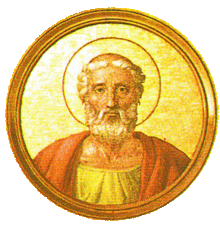Pope Liberius
|
Pope Liberius |
|
|---|---|
 |
|
| Papacy began | 17 May 352 |
| Papacy ended | 24 September 366 |
| Predecessor | Julius I |
| Successor | Damasus I |
| Personal details | |
| Birth name | Liberius |
| Died | 24 September 366 |
| Sainthood | |
| Feast day | 27 August |
| Venerated in | Eastern Orthodox Church |
|
Papal styles of Pope Liberius |
|
|---|---|
 |
|
| Reference style | His Holiness |
| Spoken style | Your Holiness |
| Religious style | Holy Father |
| Posthumous style | none |
Pope Liberius was Pope from 17 May 352 until his death on 24 September 366. According to the Catalogus Liberianus, he was consecrated on 22 May as the successor to Pope Julius I. Liberius is mentioned in the The Greek Menology - the Eastern equivalent to the martyrologies of the Western Church and a measure of sainthood prior to the institution of the formal Western processes of canonization.
He is recognized as a saint within the Eastern Orthodox Church. His first recorded act was, after a synod had been held at Rome, to write to Emperor Constantius II, then in quarters at Arles (353–354), asking that a council might be called at Aquileia with reference to the affairs of Athanasius of Alexandria, but his messenger Vincentius of Capua was compelled by the emperor at a conciliabulum held in Arles to subscribe against his will to a condemnation of the orthodox patriarch of Alexandria.
At the end of an exile of more than two years in Thrace, after which it seems he may have temporarily relented to the Arian cause, or been set up to appear to have relented – partially evidenced by three letters, quite possibly forgeries, ascribed to Liberius, the emperor recalled him under extreme pressure from the Roman population who refused to recognize the puppet "pope" Felix. As the Roman See was "officially" occupied by Antipope Felix II, a year passed before Liberius was sent to Rome. It was the emperor's intention that Liberius should govern the Church jointly with Felix, but on the arrival of Liberius, Felix was expelled by the Roman people. Neither Liberius nor Felix took part in the Council of Rimini (359).
After the death of the Emperor Constantius in 361, Liberius annulled the decrees of that assembly but, with the concurrence of bishops Athanasius and Hilary of Poitiers, retained the bishops who had signed and then withdrew their adherence. In 366, Liberius gave a favourable reception to a deputation of the Eastern episcopate, and admitted into his communion the more moderate of the old Arian party. He died on 24 September 366.
...
Wikipedia
